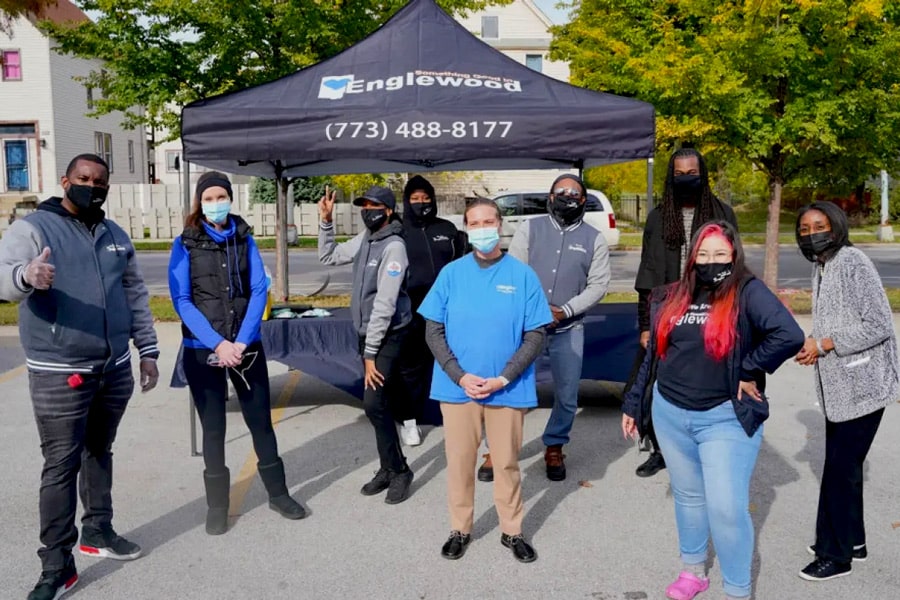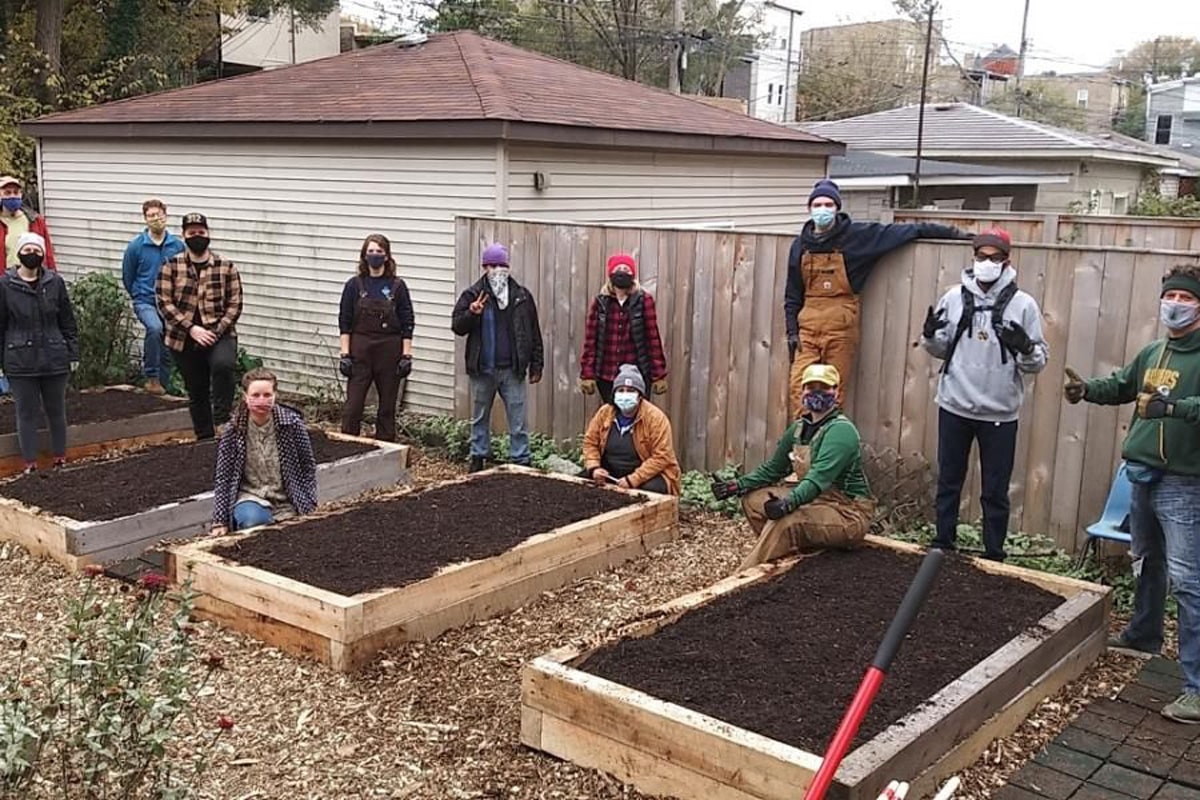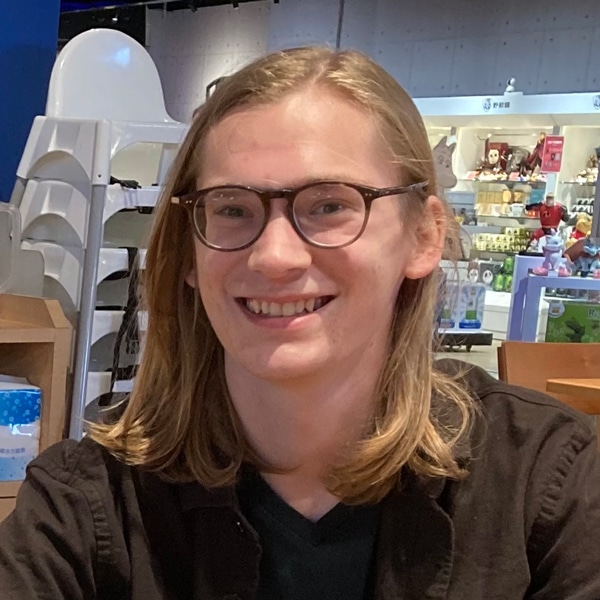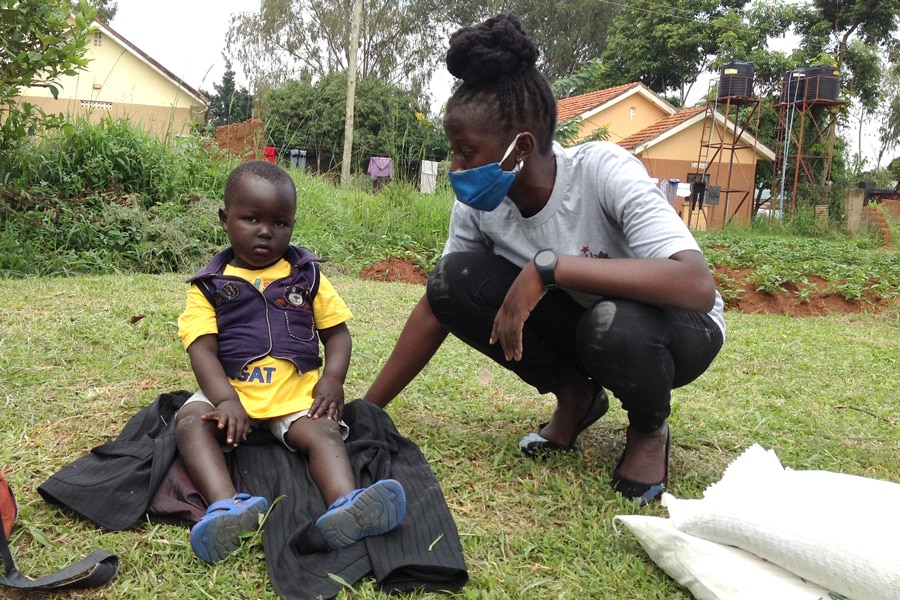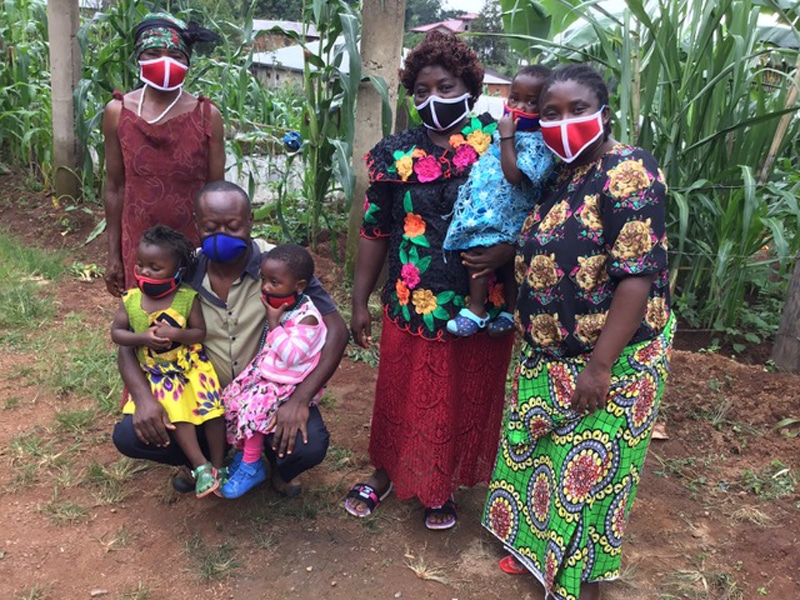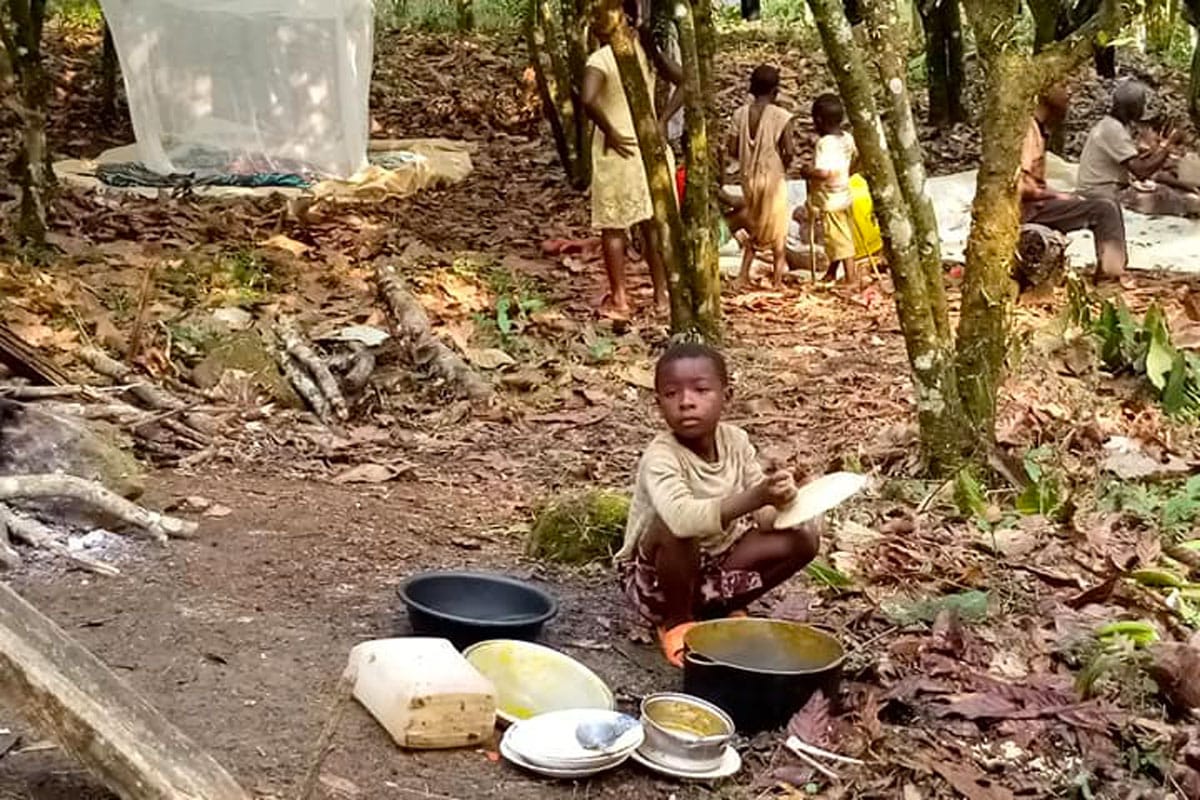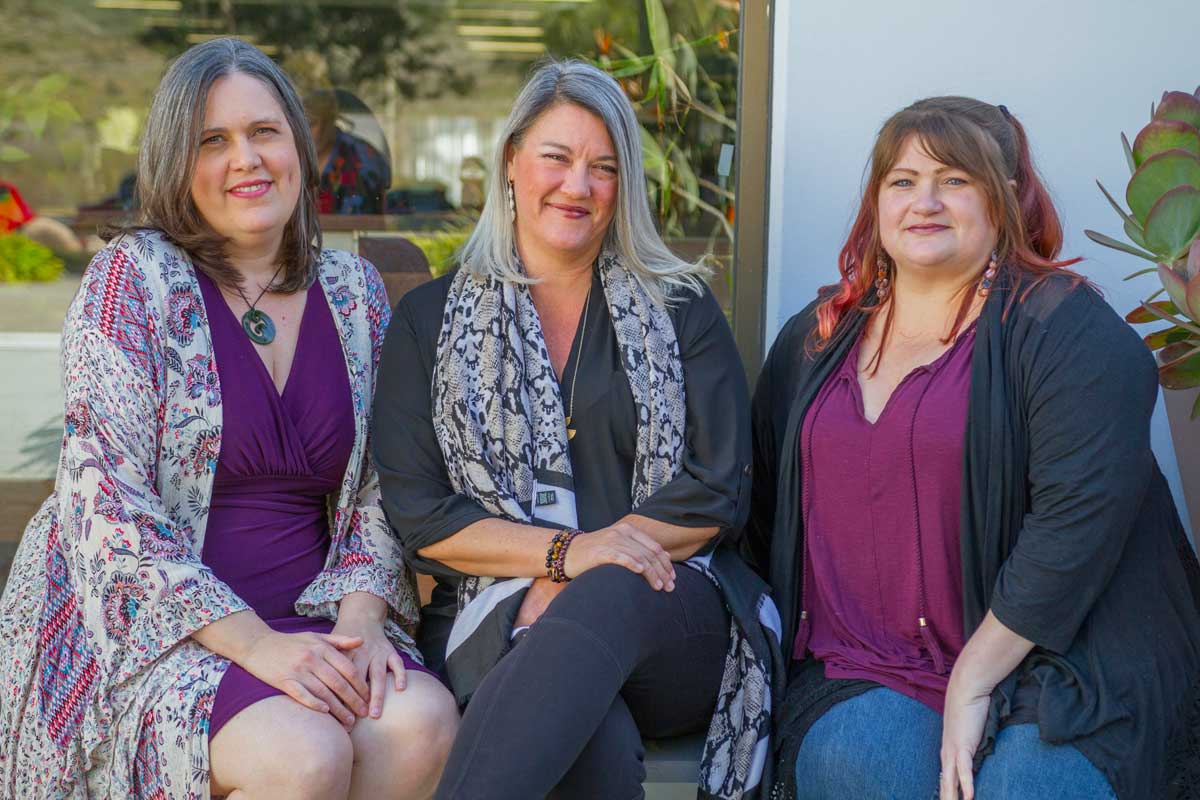Building Safer Communities with the Chicagoland Vaccine Partnership
By Zeki Salah, Mutual Aid Collaborative Facilitator
Goldin Institute Peace Fellow, Annette Kelly, is helping host a series of workshops on Violence Prevention through her work with the Chicagoland Vaccine Partnership (CVP). Annette is the founder of FOUS Youth Development Services and was connected to the CVP through a funder of her organization. The CVP work focuses on sharing quality information about COVID vaccination in the communities hardest hit by COVID by mobilizing community leaders, educating community members and elevating multi-sector collaborations.

The CVP launched a learning community platform called the Learning Community in June 2021 that offered a unique virtual space for over 600 contact tracers, resource navigators, and concerned community members. In this space, community members could support each other in doing outreach about the COVID-19 vaccines and having open dialogue about health inequities and community organizing more broadly. This work was expanded by the CVP with the founding of the Learning Community Fellows, 11 members of the Learning Community that were hired to expand the outreach of the Learning Community and assist in curriculum development. Annette was selected as a Learning Community Fellow in October of 2021.

Prior to becoming a Learning Community Fellow, Annette had 15 years of experience running school based mentoring and violence prevention programs in the West Pullman community through her work with FOUS Youth Development Services. Through her work with the CVP, Annette is expanding her organization’s community impact by addressing the public health concerns regarding both COVID-19 and violence and their disproportionate effects on communities of color.
The goal of CVP’s Violence Prevention series is to invite the CVP Learning Community participants to see gun violence through the public health lens. The series aims to protect and improve the health of people and their communities and shows how community partnerships can address these issues. Two events have already been held, focusing on multi-sector collaborations and crime reporting and data. In the first event, Vaughn Bryant and Jesus Salazar of Metropolitan Family Services shared a network of community organizations that practice trauma-informed care and restorative justice practices. In the second event, Kimberley Smith of the University of Chicago Crime Lab showed how data about gun violence could be used to redirect resources to target populations most affected by that violence. Both events drew strong responses from the participants and provided a space for community dialogue and opportunities for collaboration.
The CVP’s Violence Prevention series will include two more workshops on violence intervention strategies and the impact of block clubs. The first of these events, Giving Hope: Innovative Violence Intervention Strategies, will occur on May 4th. It will aim to address the collective trauma of the COVID-19 pandemic by linking communities to trauma-informed mental health resources. The second event, Word on the Block: A Conversation About the Impact of Block Clubs, will be held on May 11th. This event will bring in people working with local Chicagoland Block Clubs to learn from them and provide space for community dialogue. Both events will continue the Violence Prevention series’ theme of illuminating how both violence and the COVID-19 pandemic affect public health on a broad and overarching level, while providing solutions that are community based and hyper-local.
Generating food, beauty and safety for neighbors in Chicago
By Yusuph Masanja, Co-Facilitator, Global Alumni Network
Goldin Global Fellow from Chicago, Robin Cline, serves as Assistant Director of NeighborSpace, the only nonprofit land trust in Chicago that preserves and sustains gardens on behalf of dedicated community groups. NeighborSpace has helped neighbors and community groups protect over 120 outdoor sites, transforming them into places where people gather to play, to grow food together, and to organize around issues in their neighborhood.
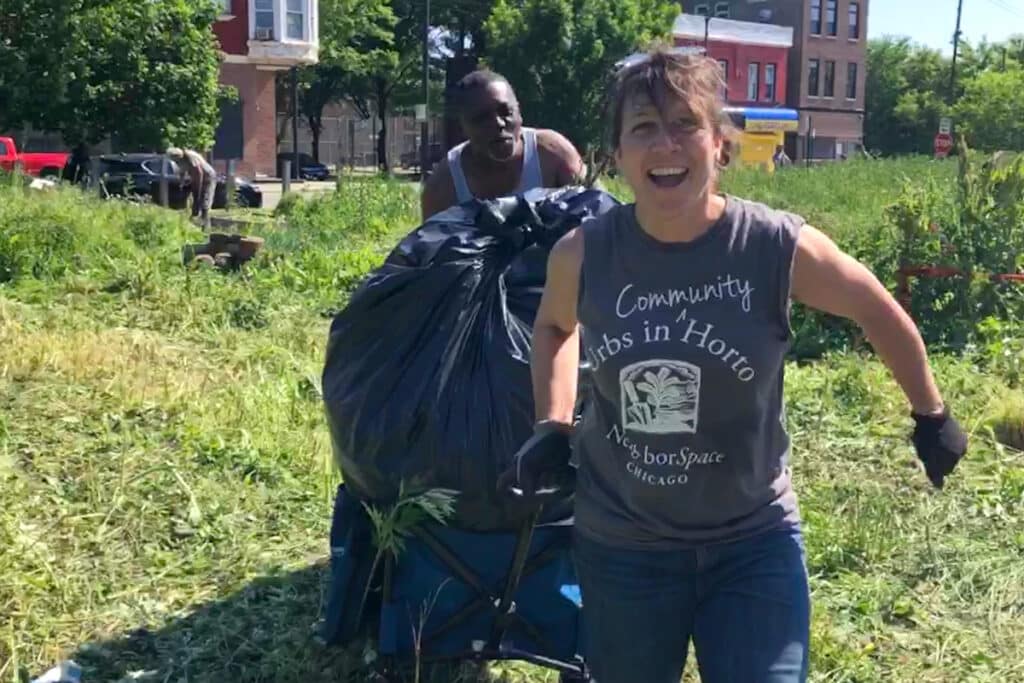
NeighborSpace continues to help community groups identify outdoor sites that can be turned into community garden spaces. They partner with early community organizations, early childhood teachers, seniors, and families in turning potential unused sites into gardens and creative gathering spaces. Especially now in the time of COVID, these outdoor spaces are more and more used as places for free haircuts, food distributions, COVID tests, and community meetings.
NeighborSpace continually works to support more growing and gathering space, and you can help with this New Year’s goal of adding 100 garden beds to NeighborSpace sites across Chicago, by visiting this Crowdfunding page to help NeighborSpace reach this goal before the 2021 growing season.
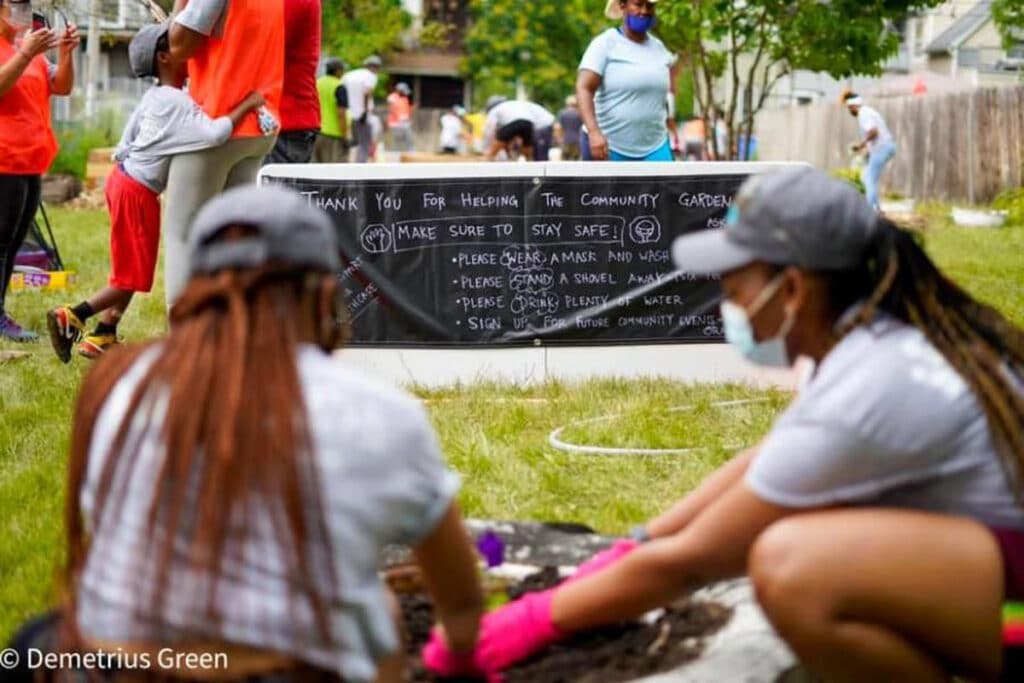
For Robin, the motivation to dive into this work comes from the goal to encourage urban people to reconnect with nature, themselves, and their community. Robin believes that if you set the right conditions for people to understand a series of processes, like that of a plant ––from seeds to fruits––it helps them understand the importance of how connected we are.
"How can we create opportunities for people to have physical connections to shared public spaces that then prompt them to have in-person connections with their neighbors?"
/Robin has recently graduated from the Visual Collaboration course which was offered by the Bigger Picture Academy. Having been inspired by this collaboration tool, she is considering applying it to support processes by which the garden leaders conduct their community building vision. Robin is mobilizing resources to provide these leaders with access to computers and the Mural application in order to learn and start using Visual Collaboration methods.
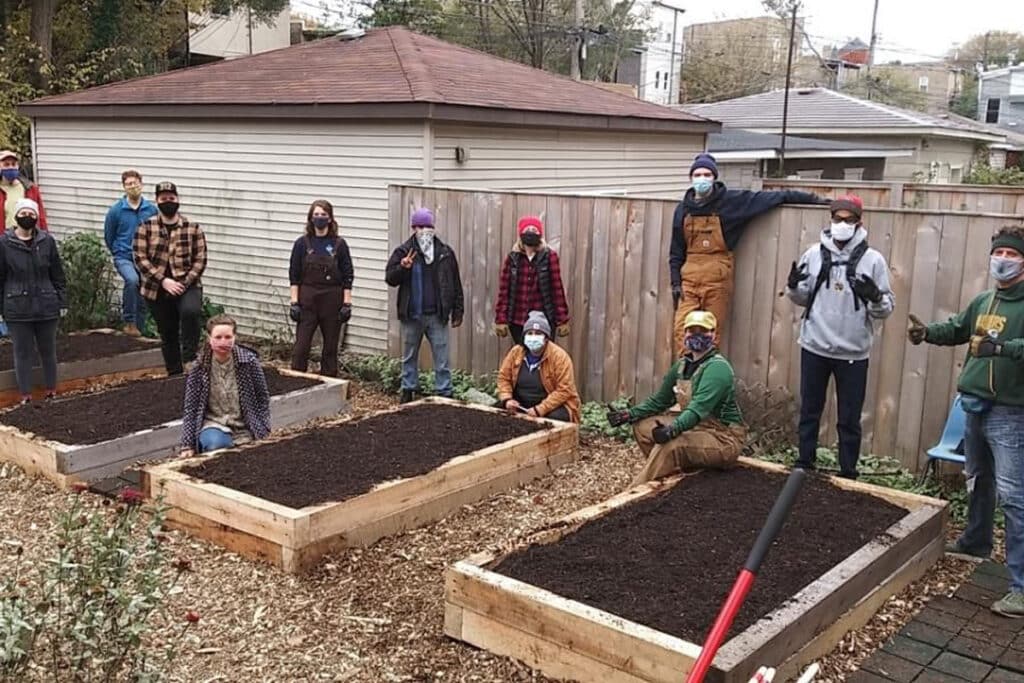
Furthermore, Robin finds inspiration from the stories of Goldin Global Fellows. The stories motivate her to keep up the good work despite challenges faced from time to time.
"Hearing other people’s stories of salvation and struggle fuels the work I am doing. We are doing non-profit work that sometimes feels invisible."
Robin adds: "The sharing of stories is so 're-storying' which is so restorative, I feel like that's an important part of the Goldin Global Fellows connection- to support each other in serving others."
YOLRED Provides Critical Supplies to Families Struggling to Survive COVID-19

When the COVID-19 pandemic hit Uganda in late March, most people who live from hand-to-mouth, saw their lives crumble as their businesses were closed and sources of livelihoods shut. According to the Youth Leaders for Restoration and Development (YOLRED) Program Director, Geoffrey Omony, a survey done by the organization early this July, and targeted at assessing the impacts of the pandemic on the Lord’s Resistance Army (LRA) survivors, revealed that many families were sleeping on empty tummies because they did not have food.

“Life has been really tough because the lockdown was sudden and the little food we had in the house could not sustain us for long,” Lilly Atong, one of the YOLRED's beneficiaries said in an interview, “The lockdown found me with ten children in the house yet I had no way to get money or food. The beads I made were not selling because my customers who are majorly foreigners coming to visit the country were no longer coming.”
Atong said even when she had just newly acquired additional skills in modern catering, she could neither establish a business because she did not have the capital, nor find employment since hotels were closed.

The Government of Uganda announced a lockdown in the country on March 23 where public transport, non-food businesses, places of worship and all forms of public gatherings were banned. A few days later, even private cars were banned from the roads and motorcycle riders were instructed to carry only luggage and no passengers as people were being encouraged to stay at home in a bid to curb the spread of the noble coronavirus disease.

To Jennifer Acan, a single mother of five, living with a disability following the amputation of her left leg, the sudden lockdown coupled with her disability, was disastrous.
We would go on empty stomach for several consecutive days, Acan said, Sometimes I would send the children to look for some wild plants so that we could boil and take.
But following the survey, YOLRED on Thursday, July 30, distributed emergency relief food, sanitary and educational materials worth over eight million Uganda shillings (about US$2,200) to at least one hundred of such starving families. The items included; 15 kilograms of maize flour, 10 kilograms of beans, packets of salt, two bars of soap, two pieces of cloth face masks and self-learning materials for their children.

“I am so glad that YOLRED thought of doing this for us,” Acan said, “At least I am sure that today I am going to eat and get satisfied. I thank YOLRED so much for standing with us. They are supporting our children in school and now doing for us this; we cannot thank them enough.”
To Kenneth Oyet, the food relief was a huge save from embarrassment, especially of a father being unable to feed his family.

“I watched with deep pain and embarrassment whenever my children would cry of hunger,” Oyet said, “Taking home these items will make me a man and father again. I would like to thank YOLRED and the people sponsoring it so much for caring about us.”
The food distribution was conducted at the YOLRED headquarters in Gulu, and witnessed by representatives from the Gulu District COVID-19 taskforce.
While addressing the beneficiaries, Felix Olanya, who led the two-man team from the taskforce, appreciated YOLRED for joining the Government of Uganda in supporting vulnerable groups within Uganda. He said, while the Government would have wished to serve everyone, its capacity was limited that was why groups like the LRA survivors did not get food relief.

Mr. Omony, said that, while they found overwhelming need from the general community, he was happy that YOLRED was able to provide those items to their beneficiaries.
As of July 30, Uganda had registered at least 1, 147 cases of COVID-19 infections and two deaths. But there is fear for a speedy spike in the number of cases and deaths as private and public transport return to the roads, businesses get opened and more people travel across the country.
In a special way, YOLRED and team would want to thank the team Goldin Institute and Carlotta Ludovica Passerini for supporting the LRA former child soldiers with life necessities and sanitary during this difficult time. Your support has been a lifesaving to our beneficiaries.
Thank You and Update from Cameroon

Dear friends and supporters,
Thank you to everyone from the global network that supported our efforts in Cameroon. As you may have seen on the news, the COVID-19 cases are rising in in Cameroon and our communities are doing our best to gear up to stay safe. Unfortunately, Cameroon is second only to South Africa in the number of COVID-19 cases. But thanks to your generosity, we have been able to purchase masks for young people, orphans and widows in two communities near Bamenda that were unprepared for the pandemic.

Unfortunately, the COVID-19 makes the other issues plaguing our community even harder to address. As I reported in my last update, the deadly clashes which have mostly been in the rural areas have led farmers to abandon their farms.

This have led to severe food shortages because local food sources are no longer available and global food chains are also disrupted because of the conflict. However, with you support, we were able to purchase fertilizers to restart the farming and purchase emergency foodstuffs for the internally displaced during this crisis.

Many problems show up in communities when times are hard. Your support also helped us do some other things that our community needed:
- we assisted a father that needed medical care for his leg
- we gave direct cash assistance to 6 families in crisis, and
- we continue to build self-sustaining and ecologically sound support for communities to help themselves.

On behalf of the community of Bamenda, Cameroon, thank you for your generosity and solidarity!
Sincerely,
Alexander Gwanvalla
GATHER Global Fellow and President, Community Green Engagement Cameroon
Caught between Two Wars

Over the past four years, I have painfully witnessed my country of Cameroon be ravaged by a steadily escalating war which has displaced thousands of civilians internally, and into neighboring countries. As the president of Community Green Engagement (COMGREEN), I and my colleagues have strived to ensure the communities which we serve not only have sustainable access to food, but also engage communities on existential climate change issues.

In the current period, we have been forced to watch, helpless to prevent the entire destruction of villages because of the fighting. Many flee to places such as Bamenda, where Community Green Engagement has its headquarters. run to the major towns like bamenda where we have our headquarters. Unrelenting gunfire and the sincere risk of interpersonal violence by warring groups makes it nearly impossible for us to work.

Further, due to the deadly clashes which have mostly been in the rural areas, farmers and ranchers have abandoned their properties leading to drastic food shortages. Now, the consequences of the COVID-19 pandemic are upon us as well. Though we have few confirmed cases of virus infection, like too many countries throughout Africa and around the world we struggle with rigorous medical testing for the disease. Additionally, the police and military are seizing the opportunity offered by the pandemic to further restrict civilian movement by enacting curfews, and deep fines for those who are outside of their home without official permission, or subjectively valid reasons. Some have been beaten for these reasons as well.
With the support of the Goldin Institute. Community Green Engagement is launching a FaceBook fundraising drive to secure foodstuffs and livestock for Bamenda and the surrounding areas we serve.

It is a very difficult time for us here in Cameroon, but Community Green Engagement continues to offer resources, training and hope. Before the fighting in Cameroon, between Anglophone and Francophone factions, COMGREEN maintained a beekeeping project, gardening, and oversaw the construction of a community center through regular civilian-focused consultations, Many stakeholders came together to discuss our most pressing problems and collectively come up with solutions. We pray the time will come again soon when we can resume such inspiring outcomes, again.
Click Here to Support the Community in Cameroon
Veterans of Crisis, Shyne’s Survivors Swing into Action

Shyne San Diego enters day 22 of self quarantine for all team members as the day breaks with news of another rescue placed safely in a hotel, a young woman experiencing mental distress safely in a hospital, and letters clipped to the mailbox filled with emergency supplies ready to be shipped.

Here on the frontlines of human trafficking, Shyne San Diego was well positioned for the COVID-19 emergency regulation orders from the start. With central operations already running remotely, we held a community vision summit via Zoom on St. Patrick's Day. Shyne is operated by a network of survivor advisors and leaders, all of whom have experienced economic disparity, freedom restrictions, emotional abuse, physical abuse, and a lack of resources. COVID-19 exacerbates these issues outwards into our communities, but gratefully, this team knew how to respond.
Cynthia Austin, the founder of Shyne San Diego, is an inaugural GATHER Fellow, who has spent the last two years nurturing asset-based community development measures locally. Shyne had in place emergency response protocols, needs assessments, coordination platforms, and the community connections necessary to mobilize their team within hours of the mandatory quarantine. The teams use Zoom regularly to train, meet and support each other, Voxer to coordinate on the ground efforts, and shared Google Drive to track impact. Monitoring community impact is a critical step in their operations. In three weeks, trends have emerged. They are seeing very quickly an increase in needs for mental health support, work options from home, rent, cell phones, internet and basic home supplies.

In response, Shyne San Diego partnered with survivor-owned nonprofit Victory Garden Sanctuary to launch the first Survivor Advised COVID-19 Fund. Shyne's innovative, bold and candid reputation has gotten them the attention of the California District Attorney's Association, Civilization Research Initiative, and community volunteer organizations. Cynthia and her team of survivor advisors are assisting with research, funding solutions, survivor-led outreach, social media awareness campaigns, equipment for hospitals, and economic strategies to weather the months ahead.

COVID-19 impact on our global community is profound and swift. Each of us have a role in minimizing the impact of COVID-19 in our communities. Resiliency is an attribute survivors of exploitation possess that's extremely valuable in overcoming difficult times. Their ability to balance tragedy with action is crucial for making quick decisions within organizations, families, communities and personal lives. Cynthia asked her team, "What is your personal responsibility with responding to this crisis?" She then told them that one’s "respond-ability" is now measured by four areas: (1) able (2) necessary (3) practical (4) meaningful. You can do the same. Let's unite the fight against COVID-19 as a community of care.
Shyne San Diego
Women's Grassroots Leadership & Professional Development
"Ending exploitation by building a network of survivor owned & operated businesses."
Twitter @shynesandiego
Instagram @shynesandiego
